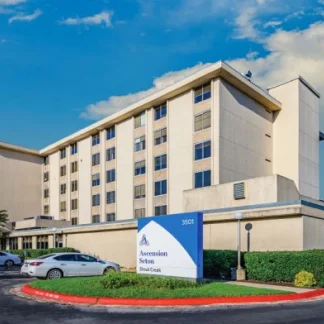Bridgeway Sober Living
Bridgeway Sober Living is a drug and alcohol rehab in Austin, Texas. They provid...
Seton Shoal Creek Hospital, in Austin, Texas, is a 12 step focused drug and alcohol rehab for youth and adults with co-occurring mental health disorders. They offer medically supervised detox, inpatient care, and aftercare support. Their primary treatment modalities combine psychotherapy with evidence based complementary care.
Seton Shoal Creek Hospital is a dual diagnosis care center in Austin, Texas providing medically supervised detox, inpatient care, and aftercare services for young and adults experiencing co-occurring addiction and mental health disorders. Gender specific and dedicated programs for adolescents and young adults are available.
Clients undergoing detox at Seton Shoal Creek Hospital receive round the clock medical supervision and may be prescribed FDA approved medications to ease withdrawal symptoms and prevent potentially serious complications.
The inpatient program at SSCH allows clients to focus on their recovery in a private, home like setting with premium amenities, including an onsite music and recreation room. Clients receive mental health assessments, personalized treatment planning, and comprehensive case management. They also engage in intensive, 12 step focused individual, group, and family counseling. Additional evidence based therapies include electroconvulsive therapy (ECT) for serious and persistent depression and related disorders. Complementary therapies, including creative arts therapy, are also available.
SSCH promotes sustained recovery through robust, wraparound care, including transitional services and step down support for clients exiting inpatient care and entering sober living houses, outpatient care, or community based recovery programs. Medical, mental health, and social service referrals are available.
Seton Shoal Creek Hospital is accredited by the Joint Commission. They accept private insurance and self pay.
Contact us for more information: (512) 324-2447

Connect with Seton Shoal Creek Hospital by calling their admissions team directly.
(512) 324-2447 Website Get DirectionsThe Joint Commission, formerly known as JCAHO, is a nonprofit organization that accredits rehab organizations and programs. Founded in 1951, the Joint Commision's mission is to improve the quality of patient care and demonstrating the quality of patient care.
Joint Commission Accreditation: Yes
Creativity is inherently healing, and can help those in recovery express thoughts or feelings they might not otherwise be able to. Creative arts therapy can include music, poetry/writing, painting, sculpting, dance, theater, sandplay, and more. Unlike traditional art, the final product matters far less than the experience of creation and expression itself.
ECT is a form of treatment in which controlled electric currents are passed through the brain, sometimes causing short seizures. Treatments are done under general anesthesia. ECT appears to change brain chemistry for the better, and has been shown to provide fast and sometimes dramatic improvements in severe mental health conditions that can exist alongside addiction, including depression, bipolar disorder, psychosis, and suicidality. ECT is also often used by those who prefer it to taking medication.
Group therapy is any therapeutic work that happens in a group (not one-on-one). There are a number of different group therapy modalities, including support groups, experiential therapy, psycho-education, and more. Group therapy involves treatment as well as processing interaction between group members.
In individual therapy, a patient meets one-on-one with a trained psychologist or counselor. Therapy is a pivotal part of effective substance abuse treatment, as it often covers root causes of addiction, including challenges faced by the patient in their social, family, and work/school life.
ECT is a form of treatment in which controlled electric currents are passed through the brain, sometimes causing short seizures. Treatments are done under general anesthesia. ECT appears to change brain chemistry for the better, and has been shown to provide fast and sometimes dramatic improvements in severe mental health conditions that can exist alongside addiction, including depression, bipolar disorder, psychosis, and suicidality. ECT is also often used by those who prefer it to taking medication.
Group therapy is any therapeutic work that happens in a group (not one-on-one). There are a number of different group therapy modalities, including support groups, experiential therapy, psycho-education, and more. Group therapy involves treatment as well as processing interaction between group members.
In individual therapy, a patient meets one-on-one with a trained psychologist or counselor. Therapy is a pivotal part of effective substance abuse treatment, as it often covers root causes of addiction, including challenges faced by the patient in their social, family, and work/school life.
Group therapy is any therapeutic work that happens in a group (not one-on-one). There are a number of different group therapy modalities, including support groups, experiential therapy, psycho-education, and more. Group therapy involves treatment as well as processing interaction between group members.
In individual therapy, a patient meets one-on-one with a trained psychologist or counselor. Therapy is a pivotal part of effective substance abuse treatment, as it often covers root causes of addiction, including challenges faced by the patient in their social, family, and work/school life.
In individual therapy, a patient meets one-on-one with a trained psychologist or counselor. Therapy is a pivotal part of effective substance abuse treatment, as it often covers root causes of addiction, including challenges faced by the patient in their social, family, and work/school life.
Bridgeway Sober Living is a drug and alcohol rehab in Austin, Texas. They provid...
Integral Care Narcotic Treatment Program is a non-profit rehab located in Austin...
Push Up Foundations – Men’s Outpatient Treatment Program is a private rehab loca...
Discovery Mood & Anxiety Program – Austin is a private rehab located in Aust...